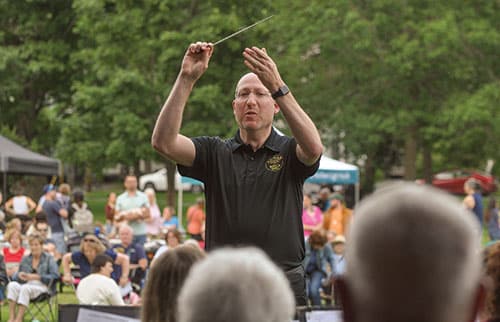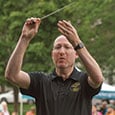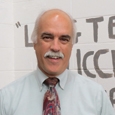
Philip Edelman is Associate Professor of Music Education and Director of the University of Maine School of Performing Arts. He is a strong advocate for lifelong learning in music, community bands, and teacher preparation that meets the post-pandemic needs of students.
As a young student, how did you become interested in music?
I came to music through jealousy! My older sister began playing piano at a young age, and I was jealous of her accolades and attention. I am not proud of that fact, but that’s what happened. My early musical education began at age eight or nine as fantastic teachers guided me in choral and instrumental music. I was a small kid, so naturally I picked the tuba.
Those first teachers were everything a beginner needs: rigorous, kind, encouraging, engaging, and supportive. They gave me the foundation to progress in my technical and musical skill set. Most notably to my career trajectory, they modeled what educators should be: content knowledge experts with the pedagogical skills to deliver instruction with patience. I was not the most well-behaved kid, but they stuck with me.
Who were your key early influences?
I didn’t realize it then, but our teachers created an environment where we kindly pushed each other to achieve as much as possible. It wasn’t competitive but a community effort through positive peer pressure. Musically, my influences were my peers at school and the various honor bands and choirs that my teachers arranged for me to play in. I didn’t grow up in a family that always played classical music, but my parents ensured that I had what I wanted when it came to music.
If my teachers suggested a piece of music to listen to, my parents allowed me to get a cassette tape or CD when at the store or the library. I was also fortunate to go to music camps when I was in high school, which cemented my love for the content.
How did your musical education continue in college?
I attended the University of New Hampshire as a tuba-playing music major with much to learn. I never had to practice much before college, so it was a new skill. My tuba instructor, Nic Orovich, helped me learn what I needed to succeed. I didn’t realize it then, but his high standards and insistence that I could achieve them gave me confidence. It also helped that I failed in many auditions during my first few years.
Similar to my experiences in middle and high school, a strong cohort of musicians surrounded me during my undergraduate studies. My mentor, Andrew Boysen, gave me and a few other students extra opportunities to hone conducting and ensemble administration skills. This solidified my love of making music and conducting. My student teaching experience strengthened this interest, which remains my greatest love.
After completing my undergraduate degree, I took a risk and moved to the middle of the country to pursue my Master of Music degree at Kansas State. It was a rich experience where I learned from some of the best role models out there – Frank Tracz, Scott Lubaroff, Lindsey Williams, and Fred Burrack. Each gave me gifts of their time and compassion. I was young and didn’t know what I didn’t know.
I was a headstrong and naive student, but each teacher took me under their wing and taught me anyway. I still think about the lessons that I learned during those years such as, “Even when you think you’re organized, there’s still more work to do” and, “Each student matters every single day.”
After teaching in public schools for seven years, I pursued a Ph.D at the University of Missouri, Kansas City. My teachers there showed me the patience that I hope to show my students – often meeting with me individually to work on complex concepts or to help me mold my research projects into meaningful, statistically sound projects. I could not have learned from better people than the ones who taught me during my Ph.D program, especially Charles Robinson and Joe Parisi.
Where and when was your first experience teaching in a school system?
My first full-time experience teaching in a school system was in the Goddard school system, near Wichita, Kansas. I began there in 2004 as a middle school band and orchestra teacher, with additional responsibilities assisting the high school instrumental music director with the high school groups.
These duties shifted over the years. I am not sure I ever taught the same course load twice. It was a wonderful program for a new teacher. The parents had high expectations, and the students worked hard. I had a variety of experiences in those formative years of my career. At a certain point, I knew that I was going to teach for the rest of my life.
What led to your decision to become a music educator?
My parents recalled that in sixth grade, I exclaimed that I would become a music teacher. I was in awe of my middle school music teachers then. I still am. My decision was reinforced time and time again throughout my school years because I was lucky enough to have some of the best teachers on the planet. I imagine that my decision was solidified through ongoing exposure to one of the best teachers I have known, Jennifer Greene.
What was your experience in public education like?
Like all teaching jobs, it had highs and lows. The highs were always about the students. Those first few years in the field allowed me to learn from an incredible mentor, Marla Weber.
I also witnessed some of the systemic issues that continue to plague us. It was not unusual for us to travel on a weekend for a marching band trip to a festival or competition, so I was able to learn from the positives and have my eyes opened to some of the inherent problems of those systems. I embraced the competitiveness and competition at the time, but my philosophy has evolved since then.
Unfortunately, at that time, I also learned what challenges some of our colleagues face in this field. We have a long way to go, and I hope I’m making a difference in the lives of my students. I can’t tell you how many times well- meaning festival workers walked past Marla (my boss) to talk to me because they thought I was the head director simply due to my gender. I could have and should have done more in the moment to ensure it didn’t continue to happen.
How did you get started in college teaching?
After earning my Ph.D I looked for positions where I could continue to make music while teaching future teachers. I knew I wouldn’t be happy as a full-time researcher or ensemble director. I wanted a job where I could teach a variety of courses and still direct an ensemble. When the University of Maine job was posted, it felt like the right fit for me.
Of course, I had never been to the University or traveled that far into Maine – so it was a scary leap. However, the community here has been incredible. The faculty welcomed me with open arms, and the band directors throughout Maine have never said no when I ask to visit them.
When I began at the University of Maine, I taught conducting and instrumental music methods and also was an ensemble director. Now, as Director of the School of Performing Arts, I generally teach one or two courses per semester, including my spring semester concert band.
Who have been your major influences?
Everyone I meet on this journey has shaped me in ways large and small. Lately, my greatest influences have been my husband and kids. They often remind me not to take myself too seriously and that taking a breath before reacting to anything can make a world of difference. My kids see the best in people, and my husband is one of the most patient people I have ever met.
As someone who trains teachers, what is your view of the impact of the pandemic on the profession?
The negative effects of the pandemic are clear – learning loss, lack of fundamentals in many students coming out of high schools, especially those who were in high school in 2020. They just lost so much of the technique that they had developed. Teachers tried hard to reach their students, but after months of Zoom lessons, the number of students making music in our state fell off a cliff.
We’re seeing the results at the university. About 30% of the students who were juniors and seniors in high school in 2020 just stopped playing, and the numbers were even higher for students in 7th-10th grades. The students we get now still can play well, but they lack awareness about how a large ensemble works.
Even if they went to a large school, many no longer had large ensembles. Playing in chamber ensembles, which a lot of them were doing, is a different way to train the ear. Getting students to listen across a big ensemble at college has been a challenge that we have embraced. We are now doing a lot more rhythm reading exercises and listening exercises. I don’t see that as a bad thing; it’s just what our students need.
Do you sometimes feel like a high school band director all over again?
Yes, and I love it! Middle school was always my wheelhouse. I’ve noticed that my current students need much more personal connection than before, which makes a lot of sense. We haven’t done a good job of teaching that to our in-service music education students in the past, and it’s something that we work on now. I hope all colleagues across the country are working on it, too.
We can teach the mechanics of playing instruments, but it is really hard to teach undergraduates to hold empathy in their heart and express it to students in class when they need it the most. It’s a real challenge, but it’s worth it.
Coming out of the pandemic, I appreciate that teachers treat their students more as human beings and not so much as cogs in a machine. When I visit teachers in the field, I see them connecting with their students as people first and musicians second.
We are handling that here with far more field experience than we ever had before. Then we ask targeted questions to our students when they get back. These might include:
• What did you notice about the student who was sitting there quietly?
• What did you notice about the student who was sitting there looking frustrated?
• What did you notice about that student that was celebrating the first time they hit a high C?
• What did you see happen to them as a human?
How can we make sure that continues to happen?
There are some teachers, particularly pre-pandemic, for whom compliance was the measure of success. A student sitting quietly is not causing a problem. I see more care now being taken by teachers not just to address the squeaky wheels but to figure out what every student needs.
What philosophy drives you as a teacher of teachers?
My favorite thing is when students can play something that they couldn’t play a week or a month ago. I love pointing out, “That’s new. How did you do that?” Transfer has to be taught and has to be explicit. We can have that conversation.“That’s great. You’re playing the Poulenc Sonata now. You could never have played that high before. What did you do?” Then we can have a deeper conversation about how to transfer this breakthrough to other musical challenges as a performer and teacher.
My philosophy of higher education isn’t terribly different from my philosophy of music education. While my goals may differ, the core tenets remain the same. First and foremost, I focus on connecting with the humanity of my students and trying hard to understand their unique perspectives and challenges. I also prioritize giving students ample opportunities to master a concept through repeated attempts. Finally, I believe in providing fair and accurate feedback to help them grow. Whether in a classroom or a rehearsal, these principles guide my approach to teaching and learning.
My goals now are to make sure my students are competent in content knowledge, so they have to know where the fifth position on trombone is. They have to know the difference between the forked F fingering on the oboe and the standard fingering. They have to know how to tune, what it means to be sharp or flat, how to communicate that information to students, and how to get students to take ownership of those musical concepts themselves.
They have to know that the G# key on the alto sax is the one that gets stuck every single time. They have to know how to apply their knowledge with actual students. Some in our field see themselves as all-powerful conductors making decisions for the entire ensemble. I am not offended by this approach but I try to lead in a democratic and caring way.
The band members, both at UMaine and in the Bangor community band that I conduct, have agency and voice when decisions are made on literature, as well as during rehearsals and in performances. We put on these benefit concerts every year, and students decide who the beneficiary is. My students send me lists and lists of music that they want us to consider programming. They vote on the music after I’ve screened it. They are the ones making logical noise in a way that is beautiful. The baton makes no music. It is just there to guide everyone.
To me, making music is intensely personal. Collaborative music making cannot happen if you don’t trust the people you are working with. If students don’t trust that I have their best interests at heart, we’re not going to have a strong performance at the end of it.
How did you get started working with the Bangor Band?
The Bangor Band was a regimental band active in the Civil War. After the war, the group started putting on concerts for the town and never stopped. We really do stand on the shoulders of giants. RB Hall was a conductor of the Bangor Band a long time ago. I have always been interested in other ways to enter the band world. When I was in Kansas City working on my Ph.D, I was the conductor of a New Horizons band. These bands are generally made up of adults who put away their instruments years ago or who want to start playing an instrument later on in life. When I came to Maine in 2016, the group needed an associate conductor to help out, and I quickly agreed.
How do you approach conducting an adult group?
In the Bangor Band we have a large chunk of members who are in their 60s, 70s and 80s, as well as a pretty sizable group who are in their 20s, 30s and 40s. One of the things that I’ve noticed over time is that our older members are not afraid to tell you when you’ve screwed up or that they disagree with your perspective on things. That has been hard to deal with at times.
One of my core values as a conductor is uplifting marginalized voices. Last spring we put on an entire concert of music by women, minority composers, and LGBT composers, highlighting such themes as women’s suffrage and the Stonewall Riots. We did a great piece by Omar Thomas called A Mother of a Revolution! I had some tough conversations and even lost a couple of members who felt our band should perform classic works from the 1950s through the 1980s and shouldn’t worry about equity or representation in our music. I couldn’t shift their perspective and wasn’t willing to shift mine. I have compromised many times, but not on this topic. Overall, the band largely understood and agreed with my perspective. Those who disagree freely speak their mind, which I have come to look forward to.
How has your teaching evolved over time?
I was a terrible teacher in my first couple of years because I focused on the music, not the students. By the third year I changed my view because students were quitting. The music sounded great but I didn’t have a strong personal connection with students. I started giving students more autonomy, even as a school director in Kansas.
I began meeting with them individually when they needed help. I started an ensemble before school. All of my students played chamber ensembles where I could hear them individually. That additional effort, along with positive and corrective feedback, led to better connections with the players. It made me a much better teacher. The program changed, and grew dramatically. I still have the same approach now.
What legacy do you want to leave in this profession?
I will feel successful if the teachers I have taught treat their students as human beings. If their students all push the right buttons at the right time, that’s a bonus. Don’t underestimate how powerful it is for students to look at their teacher and think “That teacher cares about me.” Once you win the hearts and minds of your students, the music will come along naturally if you have the content knowledge to back it up. Caring about students doesn’t always happen in other school classes. If you treat it like a two-way street, there is no limit to what you can accomplish.






